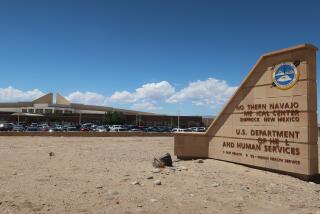The Papal Visit : Pope’s Message to Catholic American Indians
PHOENIX, Ariz. — Following are excerpts from the text of remarks by Pope John Paul II to the Tekakwitha Conference on Monday:
As your representatives spoke, I traced in my heart the history of your tribes and nations. I was able to see you as the noble descendants of countless generations of inhabitants of this land, whose ways were marked by great respect for the natural resources of land and river, of forest and plain and desert. Here your forefathers cherished and sought to pass on to each new generation their customs and traditions, their history and way of life. Here they worshiped the creator and thanked him for his gifts. In contact with the forces of nature they learned the value of prayer, of silence and fasting, of patience and courage in the face of pain and disappointment.
The early encounter between your traditional cultures and the European way of life was an event of such significance and change that it profoundly influences your collective life even today. That encounter was a harsh and painful reality for your peoples. The cultural oppression, the injustices, the disruption of your life and of your traditional societies must be acknowledged. At the same time, in order to be objective, history must record the deeply positive aspects of your peoples’ encounter with the culture that came from Europe. Among these positive aspects, I wish to recall the work of the many missionaries who strenuously defended the rights of the original inhabitants of this land. They established missions throughout this Southwestern part of the United States. They worked to improve living conditions and set up educational systems, learning your languages in order to do so. Above all, they proclaimed the good news of salvation in our Lord Jesus Christ, an essential part of which is that all men and women are equally children of God and must be respected and loved as such. This Gospel of Jesus Christ is today, and will remain forever, the greatest pride and possession of your people.
One priest who deserves special mention among the missionaries is the beloved Fra Junipero Serra, who traveled throughout Lower and Upper California. He had frequent clashes with the civil authorities over the treatment of Indians. In 1773 he presented to the viceroy in Mexico City a representation, which is sometimes termed a “Bill of Rights” for Indians. The church had long been convinced of the need to protect them from exploitation. Already in 1537, my predecessor Pope Paul III proclaimed the dignity and rights of the native peoples of the Americas by insisting that they not be deprived of their freedom or the possession of their property (Pastorale Officium, May 29, 1537: DS 1495). In Spain the Dominican priest Francisco de Vitoria became the staunch advocate of the rights of the Indians and formulated the basis for international law regarding the rights of peoples.
Unfortunately not all the members of the church lived up to their Christian responsibilities. But let us not dwell excessively on mistakes and wrongs, even as we commit ourselves to overcoming their present effects. Let us also be grateful to those who came to this land, faithful to the teachings of Jesus, witnesses of his new commandment of love. These men and women, with good hearts and good minds, shared knowledge and skills from their own cultures and shared their most precious heritage, the faith, as well. Now, we are called to learn from the mistakes of the past and we must work together for reconciliation and healing, as brothers and sisters in Christ.
Today, people are realizing more and more clearly that we all belong to the one human family, and are meant to walk and work together in mutual respect, understanding, trust and love. Within this family each people preserves and expresses its own identity and enriches others with its gifts of culture, tradition, customs, stories, song, dance, art and skills. . . .
One day Jesus said: “The thief comes only to steal and slaughter and destroy. I came that they might have life and have it to the full” (John 10:10).
Surely the time has come for the native peoples of America to have a new life in Jesus Christ--the new life of adopted children of God, with all its consequences:
A life in justice and full human dignity.
A life of pride in their own good traditions, and of fraternal solidarity among themselves and with all their brothers and sisters in America.
A deeper life in charity and grace, leading to the fullness of eternal life in heaven.
All consciences must be challenged. There are real injustices to be addressed and biased attitudes to be changed. But the greatest challenge is to you yourselves, as Native Americans. You must continue to grow in respect for your own inalienable human dignity, for the gifts of creation and redemption as they touch your lives and the lives of your peoples. You must unyieldingly pursue your spiritual and moral goals. You must trust in your own future.
As Catholic Native Americans, you are called to become instruments of the healing power of Christ’s love, instruments of his peace. May the church in your midst--your own community of faith and fellowship--truly bear witness to the new life that comes from the cross and Resurrection of our Lord and Savior Jesus Christ.
More to Read
Sign up for Essential California
The most important California stories and recommendations in your inbox every morning.
You may occasionally receive promotional content from the Los Angeles Times.









